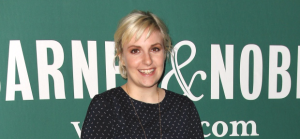
Lena Dunham’s memoir “Not That Kind of Girl” deals with issues of self-image and learning to accept yourself. The autobiography explores her personal struggles and what it took for her to find inner happiness.
“I am 20 years old and I hate myself.”
And with that, “Not That Kind of Girl” throws us into the whirlwind that is the life of Lena Dunham. Humorous, heartwarming and heartbreaking, this memoir offers up a tale of a young woman and her very real, human experiences on the road to “having it all.”
When Dunham says she’s interested in “having it all,” she’s referencing the book that inspired her own: Helen Gurley Brown’s “Having It All.” In Brown’s memoir, Dunham appreciated that “Helen shares her own embarrassing, acne-ridden history in an attempt to say, ‘Look, happiness and satisfaction can happen to anyone.’”
Dunham does the same exact thing with “Not That Kind of Girl,” providing us with her humiliating encounters and profound thoughts on young-adult life that reassure those in similar situations that it’ll all be OK.
In Dunham’s words, “If I could take what I’ve learned and make one menial job easier for you … then every misstep of mine was worthwhile.”
Split into five sections (Love & Sex, Body, Friendship, Work and Big Picture), Dunham details nearly every aspect of her multifaceted life, reminding us that she’s just a young woman, trying to make her way in the world. She takes us with her to the first time she had sex, every therapy session she’s ever been to for her anxiety, every breakup she’s had, her lack of employment post-college and her long-term struggle with body image and dieting: all relatable topics for anyone in their 20s.
An especially poignant moment happens when Dunham walks us through the sexual assault she encountered in college. In a chapter entitled “Barry,” she recounts the blurry memory of a night she went home with a man she barely knew.
“I feel like there are 50 ways it’s my fault,” says Dunham, giving us insight into her mind as she blamed herself for this rape she experienced years ago. In a time when this topic is highly debated, this particular moment is encouraging and empowering, giving a voice to young women everywhere who have had similar experiences with assault and rape on college campuses.
Between the essays of memories and mishaps, she throws in collections of lists such as “18 Unlikely Things I’ve Said Flirtatiously” (11. “I’m obsessed with the curtains in your van!”) or “15 Things I’ve Learned from My Mother” (3. “Barbie’s disfigured. It’s fine to play with her just as long as you keep that in mind.”), which provide most of the humor in the memoir, along with short and unexpectedly poignant thoughts on life.
It’s safe to say that if you’re already not a huge fan of Dunham, you won’t enjoy this book. It’s a work all about Lena: but that’s the essence of a memoir. Much of the humor resembles her HBO series “Girls,” and some familiar with the show might even recognize the likenesses between Dunham and the character she plays on the show, Hannah Horvath: a bit self-involved, struggling with crippling anxiety disorders and possessing a self-deprecating humor.
Noticeably missing from the novel is any sort of in-depth discussion on the harsh criticism Dunham has faced since the premiere of “Girls.” Although Dunham is an Emmy award-nominated, Golden Globe-winning writer, there exists a staunch opposition to her work. Many say she’s a girl who did not actually work her way to the top, having been given opportunities because of her privileged New York City childhood.
Yes, there are moments in her book akin to this way of thinking that are worthy of an eye roll: her summer home in the country, her European family trips and her casual snacking on goose liver pate as a child. But Dunham never clearly addresses criticisms about herself. There’s one moment where a student at her alma mater conducting an interview with her asks, “How does it feel to be a line item in so many people’s narratives of privilege and oppression?” At first, she doesn’t have an answer, but after some scrambling eventually replies, “There are some worse guys than me.”
Here, we don’t see Lena Dunham, the over-privileged white girl. We don’t even see Lena Dunham, the director, writer and actress. We see Lena Dunham, the young woman who is still trying to figure out the answer to this question; who is still trying to figure out life.
Admittedly, most of us reading this book might not have New York City artists for parents. We did not create an award-winning television series at 25. And we most certainly don’t “have it all.”
Most of us are just trying to figure things out. Dunham and her struggle to find simply happiness, self-acceptance and purpose offers solace to those people, encouraging all of those readers that they can one day have it all too. And that’s all she aims to do.



















